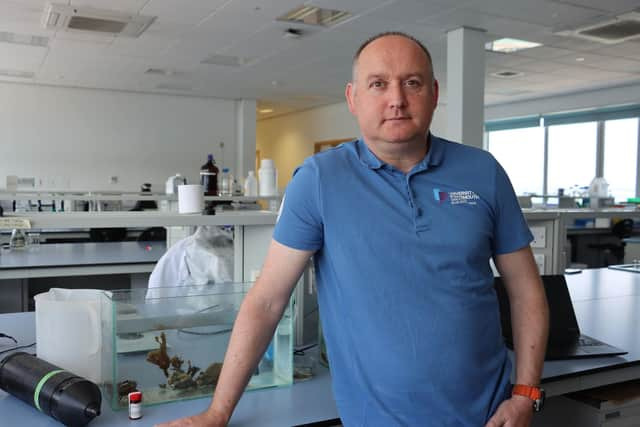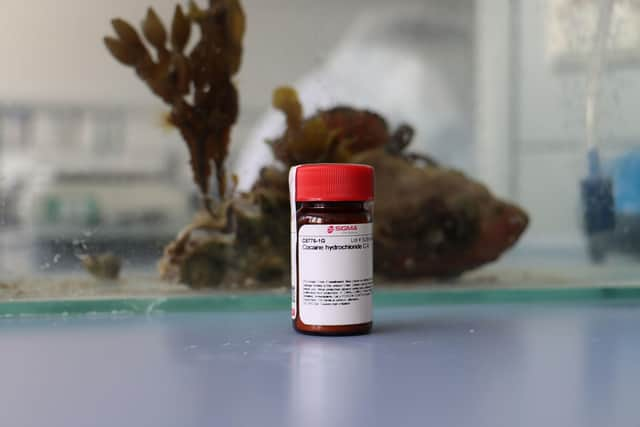‘Cocktail of chemicals’ including pesticides and cocaine found near Langstone Harbour and across south coast
and live on Freeview channel 276
Scientists have been investigating the water quality between Chichester and Langstone harbours and have found more than 50 compounds in 228 samples across 22 sites. They found pesticides – including simazine, propamocarb, imidacloprid, and clothianidin – and recreational drugs such as cocaine.
Tests also revealed E.coli levels 760 times the safe limit set by the European Bathing Water Directive. Sewage discharges and farming pollution are believed to be responsible for the chemical presence.
Advertisement
Hide AdAdvertisement
Hide Ad

Samples were taken by a group of residents called the Clean Harbours Partnership (CHP), who are concerned about pollution, and analysed by researchers at the University of Portsmouth and Brunel University London as part of Project Spotlight.
Professor Alex Ford from the University of Portsmouth’s School of Biological Sciences, said: ‘We know there are billions of litres of sewage discharges annually around the UK but the impact of these discharges are not clearly understood.
‘This project is enabling us to determine what chemical contaminants are in our marine life and coastal waters. We have found a large variety of prescribed and illegal drugs plus a variety of pesticides in coastal waters and marine organisms, such as crabs and oysters.
‘This is important, because we know that aquatic ecosystems are under threat from pharmaceuticals and farming practices such as biocides and fertilisers.’ Prof Ford has previously found that antidepressants in water can affect the behaviour, growth and reproduction of crustaceans and molluscs and can also make them change colour.
Advertisement
Hide AdAdvertisement
Hide Ad

He added: ‘There is a staggering list of prescription drugs passed from humans to wastewater treatment plants and into receiving streams, estuaries, or oceans by direct consumption, metabolism, and excretion or by toilet flushing of old prescriptions. The release of human pharmaceuticals into aquatic ecosystems is an environmental problem we should consider seriously.’
A sample taken by CHP near an outflow pipe from Budds Farm treatment works near Langstone showed a reading of 380,000 colony forming units (cfu) per 100ml of E.coli. Levels above 500cfu/100ml are a risk to human health. The scientists said they will now compare the the concentrations of these pollutants, which were found during last year’s drought, to samples taken from the same sewage overflows when discharged after rainfall.
CHP cofounder Rob Bailey said: “Thanks to community funding, we are starting to get an insight into the cocktail of chemicals polluting our sea water and their sources. Some pesticides seem to have been lingering for several years and the presence of partly digested antidepressants, drugs for type 2 diabetes and bladder infections is concerning. So little is known about their impact on marine life.
“The sheer scale of sewage discharges into our water courses has shocked the public. It looks like the debate is set to continue as we learn what’s in the water and how ineffective the authorities have been at managing such obvious threats to our precious environment.’ Project Spotlight was crowdfunded by concerned local residents, groups of water users and other organisations through the CHP, community partners, and the University of Portsmouth.
Advertisement
Hide AdAdvertisement
Hide AdIt aims to reveal what chemical contaminants are impacting important coastal environments and to influence change.
A spokesman from the Environment Agency said: ‘We are absolutely clear that polluting our seas and rivers is unacceptable. We are holding the water industry to account on a scale never seen before – including through 58 prosecutions of water companies since 2015 and a record £90 million fine for Southern Water for environmental crime.
‘We are also pursuing a major criminal investigation into potential non-compliance at wastewater treatment works and stepping up monitoring and transparency to ensure the public can see what is going on. More widely, the government’s Plan for Water set out an additional £50 million investment by Southern Water to cut the number of spills in Chichester and Langstone Harbours, Solent and the North Kent Coast by 600 every year.’